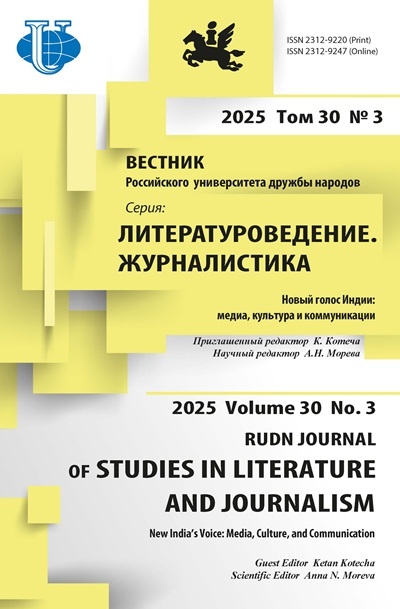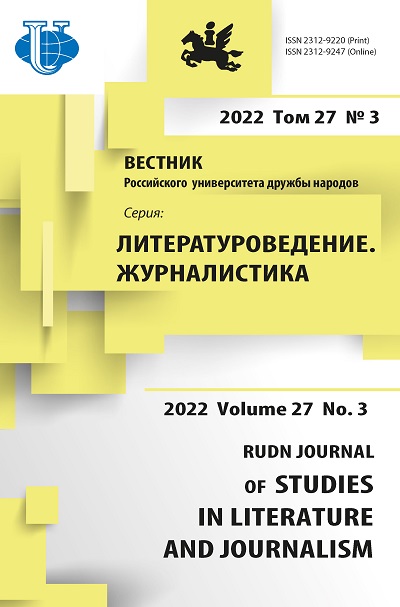Прагматическая энантиосемия социально-политических терминов и ее отражение в современных медиа
- Авторы: Куликова Э.Г.1,2
-
Учреждения:
- Российский университет дружбы народов
- Ростовский государственный экономический университет
- Выпуск: Том 27, № 3 (2022)
- Страницы: 557-566
- Раздел: Журналистика
- URL: https://journals.rudn.ru/literary-criticism/article/view/32309
- DOI: https://doi.org/10.22363/2312-9220-2022-27-3-557-566
- ID: 32309
Цитировать
Полный текст
Аннотация
Энантиосемия по степени регулярности уступает таким проявлениям системности, как полисемия или синонимия, однако она также занимает важное место в организации языковых ресурсов и проявляется на всех уровнях языка, в том числе в современном языке медиа. В исследовании речь идет об особом типе энантиосемии - прагматической энантиосемии общественно-политической терминологии, которая широко представлена в средствах массовой информации. С целью выявления социальных, психолингвистических и лингвокультурных причин возникновения прагматической энантиосемии изучены медийные контексты термина «оптимизация», при этом использовался метод дискурсивно-контекстуального и лингвопрагматического анализа, а также прием внутренней интроспекции, апеллирующий к языковой интуиции и знанию социальной и лингвокультурной ситуации. Показано, как кардинальное изменение прагматики термина формирует энантиосемию. Важным критерием изменений оказывается рефлексия авторов медийных сообщений по поводу не только понятия, но и самого термина. Семантика термина «оптимизация» поляризовалась относительно исходной: слово стало обозначать не улучшение, а ухудшение, уничтожение, слом, даже катастрофу, что позволяет говорить о формировании энантиосемии. Важно подчеркнуть, что изменение прагматики (а вместе с тем и семантического содержания) слова «оптимизация», которое произошло исключительно под влиянием экстралингвистических социальных факторов, привело к формированию именно энантиосемии, поскольку позитивный контекст остался, в принципе, возможен.
Об авторах
Элла Германовна Куликова
Российский университет дружбы народов; Ростовский государственный экономический университет
Автор, ответственный за переписку.
Email: kulikova_ella21@mail.ru
ORCID iD: 0000-0002-5305-8789
профессор, доктор филологических наук, профессор кафедры массовых коммуникаций, Российский университет дружбы народов; заведующая кафедрой русского языка и культуры речи, Ростовский государственный экономический университет
Российская Федерация, 117198, Москва, ул. Миклухо-Маклая, д. 10, корп. 2; Российская Федерация, 344002, Ростов-на-Дону, ул. Большая Садовая, д. 69Список литературы
- Авдеева М.Д., Ярославцева Е.Ф., Гараева М.В. Лексическая энантиосемия как языковой аспект категории контрарности (на материале германских и славянских языковых групп) // Филологические науки. Вопросы теории и практики. 2019. Т. 12. Вып. 8. C. 226-232. https://doi.org/10.30853/filnauki.2019.8.44
- Бродский М.Ю. Лексическая энантиосемия в сопоставительном аспекте: на материале современного английского и французского языков: автореф. дис. ... канд. филол. наук. Екатеринбург, 1998. 22 с.
- Кравцова В.Ю. Энантиосемия лексических и фразеологических единиц: язык и речь: автореф. дис. ... канд. филол. наук. Волгоград, 2006. 20 с.
- Литвинова Е.А. К вопросу о продуктивности энантиосемии (на материале русского и английского языков) // Lingua mobilis. 2012. Т. 35. № 2. С. 148-158.
- Махмутова Л.Р. Основные типы энантиосемии в современном русском языке: автореф. дис. ... канд. филол. наук. Казань, 2009. 24 с.
- Огнева С.В. Об источниках энантиосемии (на материале английского языка) // Филология и лингвистика в современном обществе: материалы IV Международной научной конференции (Москва, июнь 2016 г.). М.: Буки-Веди, 2016. С. 85-89
- Острикова Г.Н. Энантиосемия разноуровневых единиц немецкого языка: структурно-семантический, функциональный и типологический аспекты: автореф. дис. ... докт. филол. наук. Ростов н/Д., 2014. 32 с
- Романчук Ю.В. Энантиосемия и смежные явления языка // Universum: филология и искусствоведение. 2019. № 11 (68). URL: https://7universum.com/ru/philology/archive/item/8220 (дата обращения: 07.05.2022)
Дополнительные файлы















